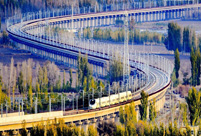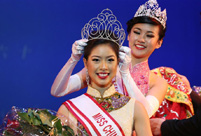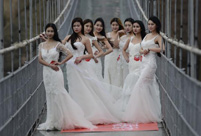

BEIJING, March 2 -- The upcoming political sessions come at a critical time for China, as even in the face of challenges it is edging closer to achieving highly ambitious goals through major reforms.
From early to mid-March, the National People's Congress, the top legislature, and the Chinese People's Political Consultative Conference (CPPCC) National Committee, China's top political advisory body, will convene their annual sessions, known collectively as the "two sessions."
In about two weeks, nearly 3,000 national legislators representing all regions, the armed forces and other groups and more than 2,200 political advisors from all walks of life will discuss major state policies to be implemented this year and a development roadmap for the next five years.
Economic development, how and in what way China will grow, and military and foreign policies will be some of the heated topics covered by attendees of the two sessions.
Against the backdrop of China's economic transition, the implementation of major reforms, and the ongoing "building of a moderately prosperous society" make the sessions worthy of note.
Premier Li Keqiang will deliver the government work report to the NPC, which will summarize the government's work last year and outline tasks for the year ahead.
The report will normally set the gross domestic product (GDP) growth rate target, as well as other indices including consumer price index (CPI) and employment.
China lowered its 2015 economic growth target to "around 7 percent," in what Li told lawmakers in March last year, in the face of "formidable" difficulties.
Official statistics showed that China's economy grew 6.9 percent in 2015 from the previous year. The growth, the slowest pace of expansion in a quarter of a century, was hard won amid a sluggish global recovery.
The lower GDP growth rate is party due to the fact that China no longer uses it as the leading index to evaluate development. As it undergoes major economic structural reform, China is moving its economy away from the former reliance on major investment projects to one driven by consumer spending.
Reducing over-capacity, levers and costs, and the championing of innovation all feature heavily in the supply-side reform drive that was put forward in January to address economic challenges.
However, despite the drop, China's GDP growth remains high, taking into consideration of its 10-trillion U.S. dollars plus base. The GDP increment is about the GDP of Argentina or Sweden, and an increase of 1 percent now is equal to 1.5 percent five years ago.
The two sessions come as China is striving to achieve its 2020 target of "building a moderately prosperous society in all respects," and policies relating to the next major development blueprint, the 13th Five-year Plan (2016-2020).
The building of a moderately prosperous society is part of the country's Two Centennial Goals -- to build a moderately prosperous society in all respects by 2020, and build a socialist modernized country by the middle of the 21th century.
The proposal for the 13th Five-year Plan will be submitted to the legislature for deliberation before it is formalized.
In a bid to achieve the goals outlined in the plan, public wellbeing will feature heavily throughout the two sessions, especially poverty relief.
Although China has experienced almost four decades of breakneck economic growth, over 70 million people remain under the poverty line. Improving the lives of this section of society, which is key to building a moderately prosperous society, has been identified as a priority work by Chinese leaders.
Subsequently, during the two sessions, legislators and political advisors will put forward motions and proposals for poverty relief.
Even those who are not so economically challenged face difficulties, such as health care, education and housing. As policies on these issues have been included in past government work reports, more are expected.
The two sessions will also see the formalization and implementation of a series of new concepts put forward by the central authorities, such as the five development ideas put forward in the CPC's 13th Five-year Plan proposal.
These core ideas are innovation, coordination, green, opening up and sharing. It expected that they will underpin much of the policies, bills and measures delivered in the sessions. It is the role of legislators and political advisors to present their opinions and suggestions on how these ideas can be implemented.
Supply-side reform, the "Four Comprehensives," and the economy's "New Normal" will also feature prominently.
Following major military reform last year, which included the restructuring of the military command system and the inauguration of new commands and forces, there will be new faces among the deputies and political advisors. It is hoped that their fresh ideas will inject new energy into military reform.
President Xi Jinping last year announced that China would reduce the military by 300,000 service people, and jettison non-combat functions such as art troupes. China's military budget this year, and how it will allocate money to the reorganization of the military, will also be discussed during the two sessions.
There is usually a press conference held by the foreign minister on the sidelines of the NPC session. As China formally inaugurated the Belt and Road Initiative last year, it is expected that foreign policy will concern the mutual development of the countries involved.
In addition, the two sessions will be used as a platform for officials to express their opinions on issues including tensions in the South China Sea, anti-corruption, environmental protection, finance and others.
 China has world's largest high-speed rail network
China has world's largest high-speed rail network Top beauties in Chinese provinces
Top beauties in Chinese provinces 600 people attend Lusheng playing contest in S China
600 people attend Lusheng playing contest in S China Engineer troop builds bridge in real combat conditions
Engineer troop builds bridge in real combat conditions You can urinate in public in Chongqing
You can urinate in public in Chongqing Rice terrace scenery in southwest China's Yunnan
Rice terrace scenery in southwest China's Yunnan 2016 Miss Chinatown USA pageant held in San Francisco
2016 Miss Chinatown USA pageant held in San Francisco Ancient pagodas across China
Ancient pagodas across China Wedding dress show up in the air
Wedding dress show up in the air Top 20 hottest women in the world in 2014
Top 20 hottest women in the world in 2014 Top 10 hardest languages to learn
Top 10 hardest languages to learn 10 Chinese female stars with most beautiful faces
10 Chinese female stars with most beautiful faces China’s Top 10 Unique Bridges, Highways and Roads
China’s Top 10 Unique Bridges, Highways and Roads Culture shock for pets
Culture shock for pets Open Internet must be controllable
Open Internet must be controllable Grown-up children of migrant workers more likely to be jailed
Grown-up children of migrant workers more likely to be jailed Smooth sailing for cruise market as passengers pass 1m mark
Smooth sailing for cruise market as passengers pass 1m markDay|Week